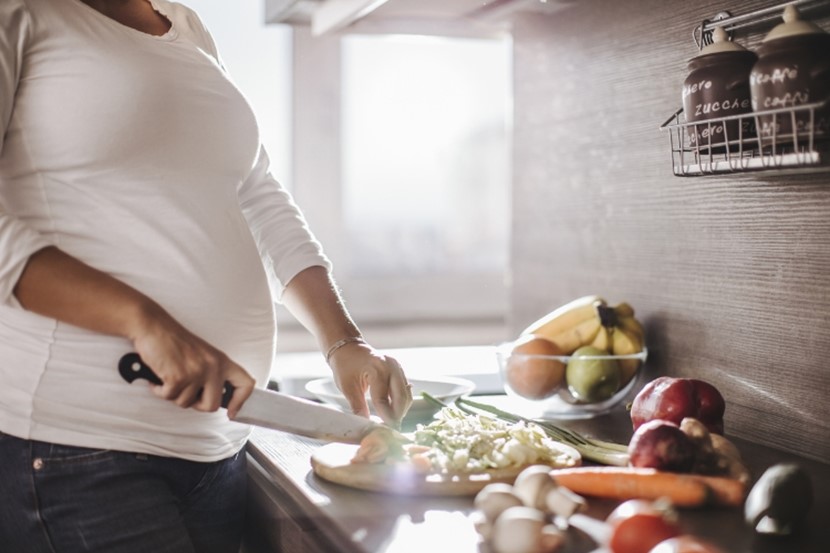Food safety during pregnancy

Your diet when you are pregnant is crucial to your baby's development. It is important to make sure that you are getting enough vitamins and minerals to help your baby grow strong and healthy. As well, pregnancy can cause your immune system to become weaker, making you more susceptible to food borne illnesses, so it is particularly important to take care with food preparation and storage, and to avoid foods which carry a high risk of infection. Food borne illnesses can cause miscarriage, stillbirth, prematurity and birth defects, but are easy to avoid if you take care with what you eat.
To make it easier for you to work out which foods are safe to eat, and which are best avoided, download our printable guide to safe eating during pregnancy and put it up on your fridge for quick reference.
The most common food-born illnesses to affect pregnant women are:
Listeria
Listeria infection can be contracted by eating contaminated foods, or from contact with soil, plants, animal or human faeces. Symptoms of listeriosis include fever, headache, aches and pains and vomiting. However, it is possible to have listeriosis and not have any symptoms. The symptoms of listeriosis may take days or even weeks to appear.
Listeriosis can cause still birth, miscarriage, prematurity or severe illness in newborn babies. Listeria bacteria thrive in cold climates such as the refrigerator, and are not killed by freezing, so certain foods should be avoided. These include:
- Soft cheeses such as Camembert, Brie, Feta, Ricotta, Mozzarella and Cottage Cheese
- Deli meats and cold cuts such as ham, luncheon sausage, pate, cold chicken
- Pre-prepared salads such as coleslaws and deli salads, and salads that have been left at room temperature for a period of time
- Parsley
The Listeria bug can be killed by cooking, so these foods are safe if heated to piping hot.
Campylobacter
Campylobacter is usually caused by undercooked or contaminated chicken, from unpasteurised milk and contact with infected animal manure. Campylobacter is the most common food-borne illness to affect pregnant women, and can cause miscarriage or premature labour. Symptoms include vomiting, fever, diarrhoea and stomach cramps.
Taking care with food preparation, and ensuring that all foods, particularly meats, are cooked thoroughly will help to protect you from Campylobacter. You should also avoid drinking unpasteurised cows milk whilst pregnant.
Salmonella
Salmonella is another relatively common food-borne illness and can cause stillbirth if contracted during pregnancy. Symptoms include headaches, abdominal pain, diarrhoea and vomiting. Salmonella poisoning is often caused by undercooked eggs and chicken.
To avoid salmonella, ensure that your chicken is cooked thoroughly, avoid precooked chickens such as those from supermarket delicatessens, and ensure eggs are cooked until the yolk is firm.
Giardia
Giardia is a food-and water-borne disease caused by a parasite found in the gut of infected humans and animals (eg, cattle, sheep, cats, dogs, rats and possums). It's passed on in the faeces of infected humans and animals, and people become infected when they swallow the parasites.
Giardia is common in New Zealand. The parasites can live in the environment for long periods – especially in lakes, rivers, streams and roof water.
You get giardia from drinking contaminated water or eating contaminated food, being in contact with infected animals that are carrying the parasite, being in close contact with someone who has giardia – eg, people living in the same house or if you’re looking after someone who has giardia, and by swallowing water that contains the giardia parasite while you’re swimming or playing in lakes, rivers, springs, ponds, streams etc.
Toxoplasmosis
Toxoplasma is widely found in animals, particularly cats and kittens, so while it's not strictly a food-borne illness, it can contaminate the soil fruit and vegetables have grown in. Many people who carry the Toxoplasma bacteria will show no symptoms, but symptoms can include fever, headache, enlarged glands and a general feeling of being unwell. Toxoplasmosis can cause miscarriage in early pregnancy, and may cause blindness or poor vision, hearing loss and other brain damage in newborns.
To avoid contracting toxoplasmosis you should wash your hands thoroughly after contact with kittens, avoid changing kitty litter or coming into contact with cat faeces, and ensure that you wash your fruit and vegetables thoroughly as they may have been grown in contaminated soil.
How you store and prepare your food when pregnant is also important. The Auckland District Health Board advises that the best rules to follow when preparing and storing food are:
CLEAN: All utensils used in food preparation, all surfaces used for food preparation including bench tops and chopping boards. It is especially important to wash all utensils/surfaces used to handle raw meat in very hot, soapy water, to kill any bacteria that may be present.
COVER: All foods, to avoid contamination from other food sources when in the refrigerator, and to avoid flies and other insects when left on the bench.
COOK: All foods thoroughly. Meat should be cooked until the juices run clear. It is not safe for pregnant women to eat 'rare' steak, or any other meat that is still pink in the middle. Cook eggs thoroughly too.
CHILL: All foods as soon as possible if they are not to be eaten straight away. Store raw meat on lower shelves in the fridge in case the juices drip, and store cooked foods on the upper shelves. If you have a long trip home from the supermarket, consider using a cooler bag or ice pack to keep food cool on the way.
And, IF IN DOUBT, THROW IT OUT!
When eating out, it can be difficult to know what foods are safe. Generally, restaurant food that is cooked to order is safe, as it is served immediately after being cooked. Avoid places where food is stored in warmers or Bain Marie for long periods, for example in food courts, or that does not display a current Ministry of Health qualification on the wall.

